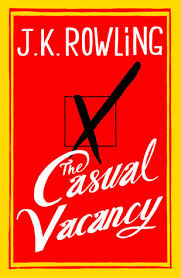The Casual Vacancy is the first novel that J. K. Rowling, author of the Harry Potter series, has written for adults. Its tagline: A big novel about a small town.
The seven novels in the Harry Potter series are beloved by children and adults alike, and while most readers will appreciate the eloquence of Rowling’s writing style and ability, and the gripping simplicity of how she writes about complex topics, most of us are really just reading those books for the story itself. The story is what keeps you reading. The characters, the plot, the setting; all of these are what compel us to flip the pages faster and faster in an urgency to find out what happens next. The story itself is so darn good that it overpowers the beauty of Rowling’s writing – and I think that we fail to see just what a great writer she is because we are too caught up in the story she is telling.
The Casual Vacancy is a little different. The story – about, in essence, a small town fighting over a parish council seat – is interesting enough, but that’s not why you continue reading. You keep reading because the writing is so beautiful and strong that it is what captivates you. Where Harry Potter seemingly relies more on the story to keep the reader’s attention, The Casual Vacancy depends much more on Rowling’s exquisite writing style.
This, then, is one of the first things that you can love about The Casual Vacancy: it showcases real talent.
But the second thing that you begin to notice as you read the novel is that not only is The Casual Vacancy about solid, powerful writing, it is also primarily a novel about classism.
Classism runs rampant. It’s something that I see occur with far too much frequency (along with racism), living in the downtown area. Classism is just how it sounds: “discrimination on the grounds of social class,” as the Canadian Oxford English Dictionary puts it. And it is prevalent in our society.
In The Casual Vacancy, we read the story of political strife in a tiny town. Peppered throughout, Rowling touches on topics of racism, homophobia, and discrimination toward people with mental illness, illustrating how commonplace all of these are. And all of them revolve around issues of classism, as the town is split in two with one side wanting to in effect “purge” the town of the people they see as beneath them, and the other side wanting to bring together people of all socio-economic backgrounds. The end result of the struggle over the parish council seat will determine which side wins out over the other.
And even within that struggle between the two sides, we discover that some of the characters are so ingrained with the notion of being in separate classes that, even though they are on the side that supposedly wants to defeat classism, they are really just doing it for the sake of the man who died and left that parish council seat empty in the first place. And so we come to another topic that Rowling explores within The Casual Vacancy: the glorification and romanticism of putting the dead on a pedestal. Throughout the novel, the characters mourn the loss of Fairbrother (the man who left the seat empty), but you begin to wonder how great of a man he really was, and how much he has simply been romanticized now that he is dead. Correspondingly, this leads into another topic that Rowling addresses: that of people giving up (or not working hard enough) to effect real change as individuals if they have no leader to stand behind.
The Casual Vacancy might at first glance be a story about preparing for an election and fighting over a council seat, but it is about so much more than that. It is about so many of the things that are wrong with our society – and perhaps from that, we can recognize those issues which are taking place all around us, every day, and take steps to address them.
